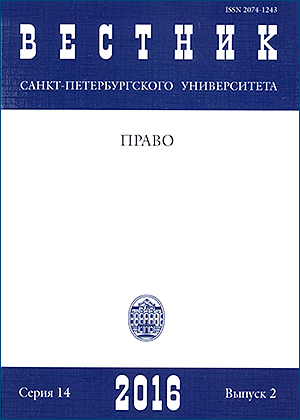Public calls to the performance of terrorists acts (Article 205.2 of the Criminal code of Russian Federation): problems of Criminal law regulation
DOI:
https://doi.org/10.21638/11701/spbu14.2016.203Abstract
In this article we provide a systematic analysis of norms of the Criminal code of the Russian Federation, of regulative legislation, of interpretations given by the Plenum of the High court of the Russian Federation, of acts of legal practice and of the results of other investigations dedicated to interpreting aspects for public incitement of terrorist activities (article 205.2 of the Criminal code of Russian Federation). The conclusion is justified that a call to engage in terrorism can be qualified as public only in case it is directed to a personally unidentified number of individuals. An appeal to individually identified persons should be qualified by part 1 of the article 205.1 of the Criminal code of Russian Federation. The argument for recognizing the propagator of an appeal as one who has committed the crime under the article 205.2 of the Criminal code of Russian Federation is proposed. It is proposed to understand terroristic activity according to the list of crimes mentioned in part 1 article 205.1 of the Criminal code of the Russian Federation. We have discovered that the problem of the minimal age of criminal liability for terroristic activities in the current edition of the Criminal code of Russian Federation is solved without abidance of the principle of systematic criminal law regulation. Public appeals for terrorist activity should be qualified under the article 205.2 of the Criminal code of Russian Federation, because this norm is particular to the article 280 of the Criminal code of Russian Federation. Refs 25.
Keywords:
public appeals, terrorist activity, publicity, criminal law
Downloads
References
Downloads
Published
How to Cite
Issue
Section
License
Articles of "Vestnik of Saint Petersburg University. Law" are open access distributed under the terms of the License Agreement with Saint Petersburg State University, which permits to the authors unrestricted distribution and self-archiving free of charge.






